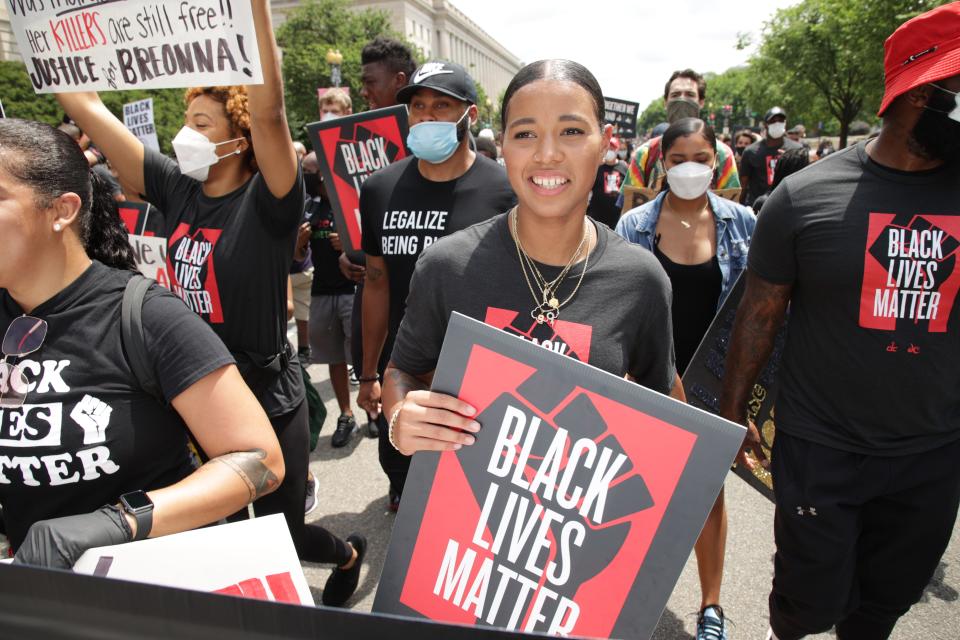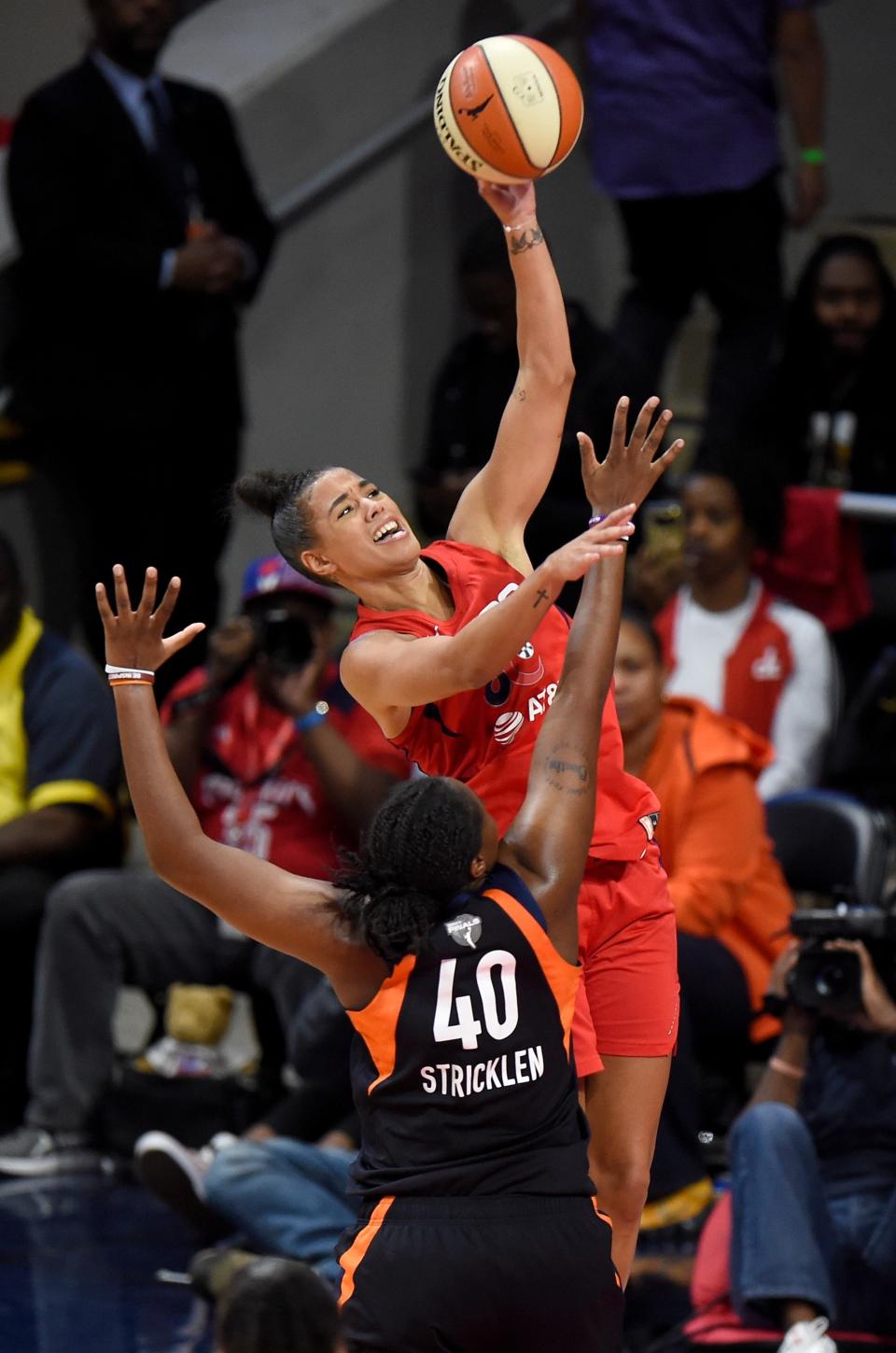The Women of the WNBA Are Leading the Way for Activism in Sports—And Have Been for Years
When the Washington Mystics became the first WNBA team to forfeit their game in protest of the police shooting of Jacob Blake, a Black man in Kenosha, Wisconsin, the team’s star point guard Natasha Cloud was cheering from her home in Philadelphia. She, like many other WNBA players, opted out of playing this season to focus on fighting for racial justice. There was a lot on the line—including her salary and a newly signed endorsement deal with Converse. “I was okay with that because, at the end of the day when we take those uniforms off, when I take that Mystics shirt off,” Cloud says, “I’m a Black woman.”
At the end of August, the WNBA joined the NBA as the second sports organization to cancel their games in order to call attention to racial injustice after Blake was shot. But in the wave of (rightful) praise for NBA players, one thing got overlooked: The women of the WNBA have been using their platform to advocate for equality for years.
Over two thirds of WNBA players are Black women, according to a 2019 report from the Institute for Diversity and Ethics in Sport—it’s no surprise the Black Lives Matter movement is close to the heart of the league. Before the start of this season, the players formed a Social Justice Council and partnered with the Say Her Name campaign to dedicate their season to Breonna Taylor. At the start of the season, the New York Liberty and Seattle Storm observed 26 second of silence to honor Taylor, who was 26 when she was killed, and players across the league have been wearing jerseys honoring Black women victims.
“We’ve been at the forefront of multiple [equality] issues, at the center of anything that matters to diverse groups of people,” Chiney Ogwumike, a forward and center for the Los Angeles Sparks and vice president for the WNBA Players’ Association told Glamour in 2019. “It’s sort of like just allowing the rest of society to catch up and discover what makes us amazing women, what makes our brand of basketball unique and special.”
Leading the Charge
Before the coronavirus threw the WNBA season’s start into question, the players were celebrating a historic collective-bargaining agreement, which guaranteed them better pay, paid maternity leave, and improved conditions on the road.
As plans for the season began to take shape, another rash of police killings of Black women and men created another cry for change. Cloud organized the Together We Stand march in Washington, D.C., on Juneteenth. She led a group of her teammates, NBA players, coaches, and staff from the Washington Wizards on a two-mile walk from the Capital One Arena to the Martin Luther King Jr. statue and memorial site.

Wizards and Mystics Juneteenth Peaceful Protest March
But Cloud wanted to do more. Feeling drawn to social justice work, she made the difficult decision to opt out of the WNBA season. “It was one of the hardest decisions I’ve ever had to make—not only in my career, but in my life,” she says. “We’re coming off winning a championship in 2019. I’m coming off one of my personal best years, and I’m also one of the leaders on the team.”
Three other players opted out of this season for advocacy work including Renee Montgomery and Tiffany Hayes of the Atlanta Dream—whose team co-owner, Senator Kelly Loeffler, has spoken out against the Black Lives Matter movement. The senator, who is up for reelection this year, sent a letter to the WNBA commissioner, Cathy Englebert, claiming Black Lives Matter has “promoted violence and destruction across the country.” Then there is Maya Moore of the Minnesota Lynx, who opted out of her second consecutive season to focus on criminal justice reform. (Moore spent the last year fighting for the release of Jonathan Irons, a man she believed to be wrongfully convicted, and saw him walk out of prison this June.)
Advocacy on an Unequal Playing Field
Taking a stand comes at a price—one that is often greater for women.
WNBA players who decided not to play in the WNBA’s COVID-secure bubble (a.k.a. the “wubble”) for non-health-related reasons forfeited their entire salary. (NBA players who opt out of their season bubble will receive a pay cut—they were able to play part of their season before coronavirus shutdowns, earning a partial salary.) The maximum WNBA salary, per the new CBA, is $215,000—the number-one NBA draft pick in 2018, meanwhile, was set to make over $8 million. “We have more risk when we speak up and step up,” Cloud says. “When the WNBA players sat out the other night, they put more on the line than our NBA brothers did because of the significant difference in pay, endorsements, sponsorship, and opportunities to be on TV.”
Cloud became the first woman athlete to sign an endorsement deal with Converse in December. When she opted out of the WNBA season, she was in breach of that contract by not playing. “I was really scared of that because I worked my ass off for five years to put myself in this position to finally get a sponsorship,” she said. Two weeks after Cloud announced that she would not be playing, Converse announced that they would cover her WNBA salary. “I cried like a baby. They understood that this was bigger than basketball, and that I was making a decision out of a genuine place in my heart. They wanted to support that 100%,” she says.

2019 WNBA Finals - Game Five
Since opting out, Cloud has been able to organize more marches in D.C. and Philadelphia. She’s taking on initiatives around voting in partnership with Converse to support When We All Vote. “For me, to be present is to be impactful,” she says. “I wanted to be on the front line. I wanted to be in the community.”
The players still on the court aren’t letting up either. Since the season has started, WNBA players have been bold and consistent in their mission to use the “wubble” platform to call out social injustices. The women have used their pregame and postgame interviews to ask fans to vote or demand justice for Breonna Taylor. They’ve worn shirts in support of these causes on their way to games. In the season’s opening game, teams walked off the court during the national anthem.
Cloud’s been in full support of her sisters. “I do miss playing. I miss going to war with my family on the court, but I’m so happy in my decision to opt out and to be able to fight on the front line,” she says.
Despite the unequal playing field, the women of the WNBA will keep demanding change as part of their legacy of making their sport and the world around them better for the next generation. “I can’t tell you why it is that we lose more when we do stand up,” Cloud says. “But I can tell you that it’s never mattered to us what we lose because we’ll continue to stand for what we believe in and what we value. We’ll continue to fight.”
Brittney Oliver is a freelance writer and marketing communications professional based in Nashville. She has contributed to Marie Claire, Business Insider, Fast Company, and Essence. Follow her work at brittneyoliver.com.
Originally Appeared on Glamour

